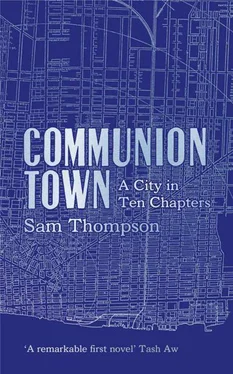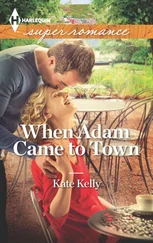His fingers rested on my hand that was gripping the guitar case. His eyes were fixed on the instrument.
‘I wish,’ he said, ‘I only wish I could try once more to play my songs.’
I held tighter.
‘I only want to borrow it,’ he said. ‘I think maybe it’ll come back. Maybe I’ll play like I used to. I only want to play one song.’
He was staring at me in what looked like dire need. I pictured the two of us sitting down on the kerb and opening the case, and then his ragged voice lifting and his fingers rippling over the strings to release unforeseeable music. I imagined him restoring the guitar to my arms, and rising with a new ease, relieved of his pain.
‘One song,’ he said. ‘Give me one song.’
I pulled away, grimacing in apology, and started walking again. Behind me the whistler began to shout.
‘Who are you?’ he bawled. ‘Where are your songs?’
He was still following me, dragging along with his broken gait, and before I could get away he made a grab for the guitar. We tusselled, and as I wrested the case away from him he stumbled backwards and fell. Sitting up, he coughed and wiped snot across his face with the back of his hand.
‘They’re not your songs, boy,’ he said. ‘They’re mine. You’ll see.’
He looked up at me with the same sly surmise I had seen on his face to begin with.
‘A mirror,’ he called after me. ‘It’s like looking into a mirror!’
But I heard no more from him, because as I turned another corner I realised where I was. This was Serelight Fair. The night’s journey fell into place: I’d been here often enough pulling rickshaws for stag parties, and tonight I had only failed to recognise the district’s drunken thoroughfares because I’d come by a roundabout route. I was fifteen minutes’ walk from Three Liberties and my own bedsit.
As I set off in the right direction, the past night already seemed less than real.
* * *
It was close to dawn by the time I got back to the bedsit, exhausted from walking. Looking around, I saw that I hadn’t been back here in days. Heaps of dirty clothes lay on the floor and the dishes in the sink showed spots of mould. I looked in the fridge but there was nothing to eat. Outside my window, the glass tube of a streetlamp glowed against the beginnings of first light.
I snapped open the guitar case, lifted out the instrument and settled on my bed with my back against the wall, wide awake. I strummed aimlessly for a while, and then wrote a new song. It took twenty minutes and was the best I had ever written. It was still built around those same few favourite chords, more or less, but inside them and between them I discovered new kinds of longing, new kinds of sweet and bitter regret, not having to dig but finding them in plain view as you might find precious flotsam after a flood.
As I sang, my sinuses seemed to fill with a clean liquid. My voice grew thick. I could feel something twisting and tightening in my chest, and as I played — feeling for the shape of the song, making sure of the rhythm, trying out a pattern of fingerpicking, tracing the melody of verse and chorus, locating the bridge, piecing together the lyrics — the sensation grew deeper until I could have sworn that the twisting had levered my chest wide open and whatever it contained had been plundered, that she’d plunged her hands in up to the shoulders and ransacked me hollow, leaving nothing behind.
The title came last. Everything that had happened between us, I realised, had folded itself down into a single night’s walk through the city, sleepless and heartsore, and so the song must be named accordingly. It was called ‘Serelight Fair’. I played until it was perfect and broad daylight was coming in at the window. Eventually I fell asleep.
* * *
She liked to walk through the park after work, so I waited all afternoon near the gate, leaning against the railings where the joggers and dog-walkers passed. I watched for a long time, occasionally thinking that I must have missed her, or imagining that she had walked right past but I had somehow failed to recognise her. Mostly I thought about nothing at all.
But when she appeared there was no mistaking her. She was in one of the short knitted dresses she wore with coloured tights, and she looked serious, gripping her shoulder bag close against her, with eyes forward, forehead creased and mouth pursed. I could never have missed her. She was the more strikingly herself for being a stranger again, another pedestrian on her way home to a life you could only guess at.
I hurried after her, calling her name. Heads turned, and she paused and waited, but her face gave nothing away. Other homebound workers stopped to watch me approach, and a couple of the males, seemingly by instinct, moved forward a step or two as if they might need to put themselves in between us: but they weren’t sure of what they were seeing, and as we came together they turned dubiously away.
We stood still in the flow of passers-by, chilly among bright flowerbeds. She looked drawn and polite, but then all the distance drained from her face and left only a question behind. In my head I heard an old country song from her record collection. I swear that I won’t make your exit slow, But won’t you break my heart before you go … I reached for her hand and she let me take it. She gave me a tired, convalescent smile, as though she knew what it was that I wanted to say.
She was determined I should see the house where she had grown up. It was in the south, an hour’s train journey out of the city through gentle yellow hills. In the middle of a hot afternoon we alighted at a market-town railway station and climbed into a taxi. As we were driven out of the town along narrow roads banked by groves in which olive-pickers were working, my nose started running and my eyes began to itch. I blew my nose loudly into my handkerchief and was ambushed by a sneezing fit. When I looked over at her, stricken, she burst out laughing. Over his shoulder, the taxi driver said something jocular that I didn’t catch.
The setting of her childhood and adolescence was a villa in the colonial style, built around a large central courtyard, with terracotta tile roofs and stucco walls the colour of baked earth. The first-floor windows opened to broad balconies. As we climbed out of the taxi, the front doors of the house opened, and for an instant it appeared she had brought me here to introduce me to her exaggerated, faintly parodic doppelgänger. The resemblance was strong, in spite of the older woman’s cream linen suit, her mass of orange hair, her cinched waist and billowing bosom. She wore heavy, precise make-up, with lips and eyebrows marked out in shapes identical to her daughter’s. They kissed three times on alternating cheeks and then the mother turned with stately poise to acknowledge me, holding out a hand, like something held in tongs, for me to shake. In the shadows of the hall behind her I glimpsed two pre-teenaged forms and heard sisterly whispers, but as we went in they fled with a slapping of sandalled feet.
Lunch was about to be served on the terrace, her mother said. I followed them through the cool house. Father would not be joining us for lunch, her mother added as we emerged into the light again at the rear of the house, since he had so much work to do.
The terrace looked across a silver-grey valley. All the olive trees I could see, her mother told me, belonged to the family. In the middle distance I made out the red rooftops of the town, stacked in the lee of a hill. A heavy wooden table in the centre of the terrace was already set with bread, cured meat, salad, wine and olive oil. I brushed my hand against hers, but something had annoyed her; as we sat down to eat, she rolled her eyes, letting her hair fall sulkily across her face as if she regretted coming here at all. Her mother carried on the conversation single-handed, telling me I would find it most interesting to be here at harvest time and, what’s more, I was especially fortunate because a Boy Singers Troupe was in town — I must make sure to see them perform because it was a fine old tradition and I must seldom have the opportunity … While she kept up a glassy monologue, the two girls, to whom I hadn’t been introduced, exchanged continual scandalised glances, nudging each other under the table and occasionally exploding into giggles.
Читать дальше
Конец ознакомительного отрывка
Купить книгу












